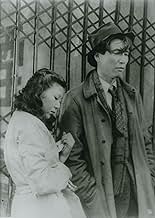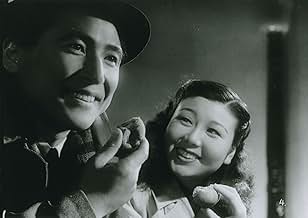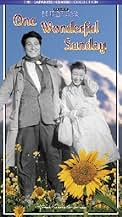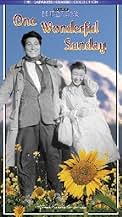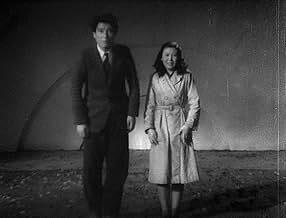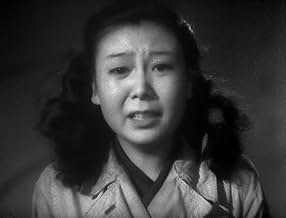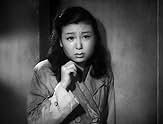AVALIAÇÃO DA IMDb
7,2/10
3,9 mil
SUA AVALIAÇÃO
Yuzo e a sua noiva Masako passam a tarde de domingo juntos, tentam divertir-se com apenas trinta e cinco ienes. Têm muitas pequenas aventuras, porque o otimismo e a crença de Masako são capa... Ler tudoYuzo e a sua noiva Masako passam a tarde de domingo juntos, tentam divertir-se com apenas trinta e cinco ienes. Têm muitas pequenas aventuras, porque o otimismo e a crença de Masako são capazes de tirar Yuzo do desespero da realidade.Yuzo e a sua noiva Masako passam a tarde de domingo juntos, tentam divertir-se com apenas trinta e cinco ienes. Têm muitas pequenas aventuras, porque o otimismo e a crença de Masako são capazes de tirar Yuzo do desespero da realidade.
- Direção
- Roteiristas
- Artistas
- Prêmios
- 2 vitórias no total
Sachio Sakai
- Shady Ticket Man
- (não creditado)
- Direção
- Roteiristas
- Elenco e equipe completos
- Produção, bilheteria e muito mais no IMDbPro
Avaliações em destaque
This simple movie of a young, poor couple trying to enjoy their day off with little money is the best non-Italian neorealist film I've come across. True to the neorealist spirit, not a lot goes on; a gloomy Gus and his girlfriend wander the city, she trying to bring him out of his depression while it seems all of life is determined to keep him in it.
The movie does a good job of painting a picture of Japanese post-war poverty. Chieko Nakakita gives a wonderful, charming performance as she tries to cheer her beau and to fight against her own distress at their plight. Some scenes are truly striking, notably a trip through an uptown club and a tense, almost wordless scene between the two lovers.
The final big scene in the film drifts away from neorealism. It's an odd scene, and from a critical point of view I'm not sure what to make of it, but viscerally I found it rather affecting. I would love to know how audiences responded in Japan at the time.
There are a few issues in the movie. Some scenes go on too long (like the aforementioned "final big scene." And the guy's sudden emotional upswings often seemed to come out of nowhere, unlike his depressions, whose genesis was always clear. But overall it's a very human, simple movie with moments of joy and moments of pain, and I highly recommend it.
The movie does a good job of painting a picture of Japanese post-war poverty. Chieko Nakakita gives a wonderful, charming performance as she tries to cheer her beau and to fight against her own distress at their plight. Some scenes are truly striking, notably a trip through an uptown club and a tense, almost wordless scene between the two lovers.
The final big scene in the film drifts away from neorealism. It's an odd scene, and from a critical point of view I'm not sure what to make of it, but viscerally I found it rather affecting. I would love to know how audiences responded in Japan at the time.
There are a few issues in the movie. Some scenes go on too long (like the aforementioned "final big scene." And the guy's sudden emotional upswings often seemed to come out of nowhere, unlike his depressions, whose genesis was always clear. But overall it's a very human, simple movie with moments of joy and moments of pain, and I highly recommend it.
Not one of my favourites from Akira Kurosawa- hard because he is one of cinema's greatest directors with a lot of great films- but when talking about his most underrated films One Wonderful Sunday would be a strong contender. A few scenes go on for a little too long, other than that there was not really anything that came across as wrong. Admittedly the ending is an odd one but also amusing and affecting, one of those endings that wasn't a problem for me but one also that will work for some and not so much for others. While not the most audacious visually of Kurosawa's films One Wonderful Sunday is still beautifully shot, going for the simple (but not simplistic) approach rather than one that, considering the tone of the film, could fall into overblown-style territory. Kurosawa's direction for so early on in his career directs more than capably, One Wonderful Sunday is different in a way for him- one of his most simple films for sure- but there is clear evidence of knowing how to direct with style and he seems to be very comfortable with it. The music when used fits very well and will please any listener. The writing is amusing and uplifting while also peaceful and poignant, and with the story there is a playful tone in places, a dream-like one in others and then there are a lot of scenes where it is endearingly sweet and has a lot of emotional impact. There is poverty as a theme but it's not used heavy-handedly at all. The acting is very good if not among the greatest performances of a Kurosawa film. Then again, you shouldn't expect that, and that is the same with the film too, even if it isn't one of Kurosawa's finest it does deserve to be judged on its own merits of which One Wonderful Sunday has a great many. Coming back to the acting, Chieko Nakakita is captivating right from her appearance to how she grabs the attention of the viewer even in the simplest of things. Overall, a beautiful film and deserves to be better known and seen much more than it is at the moment. 9/10 Bethany Cox
Far from being one of Kurosawa's best films, it is still a powerful and thoughtful one. He had already developed his filmmaking mastery at this point of time, and it can surely be seen by the way some of the scenes are made.
The film concerns a story of love surrounded by poverty and despair; the main characters of the film have the whole Sunday to go out and be together, the only problem being their shortness of money, as they only had 35 yens to go through the day. Being short of money as they were, there were not many things they could do, so they had to spend them wisely. This mainly leads to frustration from both sides, and so the film becomes depressing most of the time, even though they are really in love with each other and are happy to have a day available for them. Throughout the film they will encounter many obstacles and disheartening experiences, which will push them towards feeling impotent, but they always manage to bring happiness out of all that awful moments, and there is where the magic of this film resides.
It might seem like a simple, clichéd love story we have always been familiar with, and it actually could have just been that, if it was not for the Excellency of Kurosawa's filmmaking skills. He brings magic to many of the main scenes of the film, which definitely increases the experience by showcasing everything in detail. The last scene is really outstanding because of the way it is portrayed; you can actually feel both the pain and happiness they are feeling.
In conclusion, this film is definitely overshadowed by other masterpieces from Kurosawa's filmography, and is definitely not the best from him, but this little film is not to be skipped if you really like the director.
My score: 7.7/10
The film concerns a story of love surrounded by poverty and despair; the main characters of the film have the whole Sunday to go out and be together, the only problem being their shortness of money, as they only had 35 yens to go through the day. Being short of money as they were, there were not many things they could do, so they had to spend them wisely. This mainly leads to frustration from both sides, and so the film becomes depressing most of the time, even though they are really in love with each other and are happy to have a day available for them. Throughout the film they will encounter many obstacles and disheartening experiences, which will push them towards feeling impotent, but they always manage to bring happiness out of all that awful moments, and there is where the magic of this film resides.
It might seem like a simple, clichéd love story we have always been familiar with, and it actually could have just been that, if it was not for the Excellency of Kurosawa's filmmaking skills. He brings magic to many of the main scenes of the film, which definitely increases the experience by showcasing everything in detail. The last scene is really outstanding because of the way it is portrayed; you can actually feel both the pain and happiness they are feeling.
In conclusion, this film is definitely overshadowed by other masterpieces from Kurosawa's filmography, and is definitely not the best from him, but this little film is not to be skipped if you really like the director.
My score: 7.7/10
I loved this film for all the reasons already advanced on this board. A story about two lovers who have only each other in a devastated, corrupted, and occupied society is universal in every sense.
I think Kurosawa's postwar films are especially interesting from a political point of view. All of his films had to pass U.S. censors, and so his political comments are shrouded in symbolism and cinematic sleight of hand. American occupation authorities doubtlessly viewed this film as a simple tale of struggling lovers. But a closer look reveals much more.
"Yuzo" is a war veteran down on his luck. Millions of Japanese war veterans returned home to a society ashamed of their service and anxious to forget their failure. "Masako" is his lover but their future together is rendered difficult by their mutual poverty.
Kurosawa gives us glimpses of pathetic war orphans, destitute women forced into prostitution, and a new economic oligarchy made wealthy by black markets. The ruins of Tokyo are presented only on distant horizons or as incidental background, but the damage inflicted by the 20th U.S. Air Force is clearly implied. None of these elements would ever pass U.S. censorship had they been essential to the story.
Postwar Japanese audiences. however, doubtlessly recognized these subtle references to their occupied and devastated country. That Kurosawa could express these matters without provoking American censorship is itself a testament to his artistic skills.
I think Kurosawa's postwar films are especially interesting from a political point of view. All of his films had to pass U.S. censors, and so his political comments are shrouded in symbolism and cinematic sleight of hand. American occupation authorities doubtlessly viewed this film as a simple tale of struggling lovers. But a closer look reveals much more.
"Yuzo" is a war veteran down on his luck. Millions of Japanese war veterans returned home to a society ashamed of their service and anxious to forget their failure. "Masako" is his lover but their future together is rendered difficult by their mutual poverty.
Kurosawa gives us glimpses of pathetic war orphans, destitute women forced into prostitution, and a new economic oligarchy made wealthy by black markets. The ruins of Tokyo are presented only on distant horizons or as incidental background, but the damage inflicted by the 20th U.S. Air Force is clearly implied. None of these elements would ever pass U.S. censorship had they been essential to the story.
Postwar Japanese audiences. however, doubtlessly recognized these subtle references to their occupied and devastated country. That Kurosawa could express these matters without provoking American censorship is itself a testament to his artistic skills.
I had said two weeks ago, in a review of Scandal, that Eclipse's new Kurosawa box set could just as easily be called Lesser Kurosawa. That's not fair. I know there are those who champion The Idiot and No Regrets for Our Youth, and even the one film I had previously seen from the set, I Live in Fear, is quite good (though it's hard to argue with it being a lesser film is such an outstanding oeuvre). The truth was, I was hoping very much to find some lesser-known Kurosawa classics. Which brings us to One Wonderful Sunday. Judging solely by IMDb's votes, it's Kurosawa's third least seen movie. And it ranks #26 out of 30 when listed by ratings. Well, I'll be happy to act like I was the first who discovered this hidden gem in Kurosawa's catalogue. This really is a wonderful little film. Influenced very much by Vittorio de Sica, one of Kurosawa's favorite directors, One Wonderful Sunday follows two young lovers, Yuzo and Masako (Isao Numasaki and Chieko Nakakita), spending the titular day together with nothing but ¥35 between them. The two experience sadness and hardship as they go about their date. The structure is episodic, as the lovers experience odd vignettes, meeting various post-war types, like bums and orphans and ticket scalpers. The two try to be happy with each other's company, but Yuzo's poverty makes him feel like less of a man. In one of the strongest sequences in Kurosawa's career, Yuzo decides to act like a cad to drive Masako away. Kurosawa was hardly ever the subtle type, and he is not known for long periods of silence or long takes. This sequence demonstrates a different side of the director. The climax of the film involves an odd breaking of the fourth wall resembling the device in J.M. Barrie's Peter Pan. As far as I know, this is the only time Kurosawa ever attempted such a thing. That wouldn't be too surprising, though, as film audiences rarely interact with characters on screen. It's just too out there for the medium. But God bless Kurosawa for trying it. It's kind of schmaltzy, but I loved the characters so much that at least I thought about clapping for them. A forgotten near-masterpiece.
Você sabia?
- CuriosidadesThe film's climax was considered a failure in both Japan and the U.S. as audiences refused to clap for the lead characters, though supposedly it went over very well in France, gaining much audience participation.
- Erros de gravaçãoA clock is seen above a shop in the baseball scene. The time showing is 5:05, but it is still only morning.
- Trilhas sonorasLa Cumparsita
Composed by Gerardo Matos Rodríguez
Principais escolhas
Faça login para avaliar e ver a lista de recomendações personalizadas
- How long is One Wonderful Sunday?Fornecido pela Alexa
Detalhes
- Data de lançamento
- País de origem
- Idioma
- Também conhecido como
- One Wonderful Sunday
- Locações de filme
- Toho Studios, Tóquio, Japão(Studio)
- Empresa de produção
- Consulte mais créditos da empresa na IMDbPro
- Tempo de duração1 hora 48 minutos
- Cor
- Mixagem de som
- Proporção
- 1.37 : 1
Contribua para esta página
Sugerir uma alteração ou adicionar conteúdo ausente

Principal brecha
By what name was Um Domingo Maravilhoso (1947) officially released in India in English?
Responda
